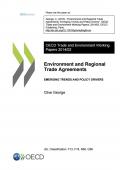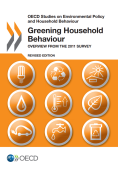This paper provides a detailed explanation how the law of the World Trade Organization regulates environmental subsidies with a focus on renewable energy subsidies. The paper begins by discussing the economic justifications for such subsidies and the criticisms of them and then gives examples of categories of subsidies. The paper provides an overview of the relevant World Trade Organization rules and case law, including the recent Canada-Renewable Energy case. The paper also makes specific recommendations for how World Trade Organization law can be improved and discusses the literature on reform proposals. The study finds that because of a lack of clarity in World Trade Organizaion rules, for some clean energy subsidies, a government will not know in advance whether the subsidy is World Trade Organization-legal.
This white paper seeks to define the concept of a green economy within the economic, social, and environmental realities of the country. The paper's overall objective is to advance the state of knowledge in Canada on green economy concepts and practices, and to serve as a reference document for further engagement and dialogue.
More specifically, the paper addresses the following questions:
- How does a definition of the green economy in Canada balance the reality of continuing economic growth, particularly in the resource sector, with evidence of local and global environmental impacts and thresholds?
- Which indicators can provide information on Canada's progress at a macro-economic, sectoral, and firm level?
- What gaps exist in the knowledge and understanding of the green economy in Canada, particularly in terms of data and analysis?
- How can the Canadian economy become more innovative and competitive in the context of global resource scarcity, climate change, and emerging clean technologies?

This report examines trends in the use of environmental provisions in Regional Trade Agreements and identifies factors which may explain the presence or absence of these provisions. The report builds on work of the OECD Joint Working Party on Trade and Environment (JWPTE) and includes results of an informal survey of delegates.
Analysis of the environmental provisions in RTAs reveals an encouraging upward trend. While basic provisions remain the most common types found in RTAs, the incidence of more substantive provisions has increased significantly in recent years. Among these, environmental co-operation has been the most common type.
Several factors may have contributed to this evolution. These include countries extending their political mandates for RTAs, for example to include provisions for compliance with multilateral environmental agreements (MEAs), as well as a general accumulation of experience with the use of environmental provisions.
The report includes case studies from Australia, Canada, Chile, the European Union, Japan, New Zealand, United States and Switzerland.

Developing growth strategies that promote greener lifestyles requires a good understanding of what factors affect people’s behaviour towards the environment. Recent OECD work based on periodic surveys of more than 10, 000 households across a number of countries and areas represents a breakthrough by providing a common framework to collect unique empirical evidence for better policy design.
This publication presents responses from the most recent round of the OECD survey implemented in 2011 in 5 areas (energy, food, transport, waste and water) and 11 countries: Australia, Canada, Chile, France, Israel, Japan, Korea, the Netherlands, Spain, Sweden and Switzerland.
Analysis comparing the data across countries, policy conditions and households’ characteristics reveals which measures most effectively change behaviour. Each round of the survey also allows to track changes over time and to explore new emerging issues.
This report investigates how cities can use different instruments to integrate the environment into urban planning and management approaches. Including: policy instruments, process instruments, planning instruments and management instruments. The report examines how these instruments are applied to several well established approaches to integrated urban planning. It examines the characteristics, strengths and weaknesses of Integrated Development Plans, City Development Strategies, ecoCity Planning, ecoBUDGET and Strategic Environmental Assessment.
The report also includes 12 case studies of cities that have worked to integrate the environment into their planning processes including: Egypt (Alexandria), Thailand (Bangkok), Republic of Cuba (Bayamo), the Philippines (Bohol), Bulgaria (Bourgas), Canada (Calgary), South Africa (Cape Town), Brazil (Goiânia; Porto Alegre), Columbia (Manizales), Kenya (Nakuru), and the People’s Republic of China (Yangzhou).
